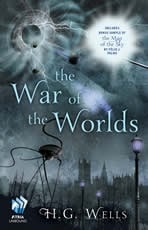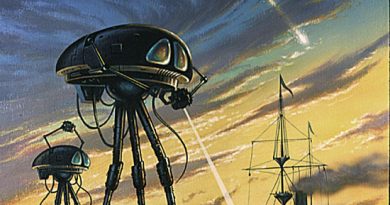The War Of The Worlds by HG Wells (e-book review).
History students are often advised to go back to the source material and this is not a bad practice for Science Fiction fans neither. This week I watched ‘20,000 Leagues Under The Sea’ on afternoon television, the Walt Disney version with Kirk Douglas playing a two-fisted all-American blockhead. It was fun but one day I intend to get round to reading the original text by Jules Verne. For now, I’m reading HG Wells.
‘The War Of The Worlds’ has not been so badly treated by Hollywood though it has been Americanised and updated. In the book, the Martians land in Surrey, near London, and there are quite detailed descriptions of the geography at that time. Inherent in the text, too, are hints about the values and customs of the late Victorian era. A man reporting on the initial strange events is ignored by most because he looks a bit wild and isn’t wearing a hat. More striking, to the modern reader, are the limitations of the technology in 1898, particularly communications. The Martians can land and get organised quite slowly. By the time anyone is taking them seriously, it’s too late. Nowadays, the world would know within five minutes. Back then, a policeman on a bicycle had to report back to his station and they might send a telegram to London. Horse-drawn carriages and trains were the fastest transport. The only media was newspapers, which came out the following morning. This is not very effective for coping with a sudden invasion.
The story is told in the first person by an unnamed protagonist who is dwelling quietly in Mayberry Hill, near Woking. He also tells us a bit about his brother’s adventures in London, which he clearly found out later.
It all starts when, from the observatory near his home, explosions are seen on the surface of the planet Mars. Shortly after, a mysterious object falls from space and lands on Horsell Common. Various adventures follow and I won’t spoil the plot.
The prose is quiet, measured, very restrained and English. John Wyndham, who later wrote an excellent invasion story of his own, ‘The Day Of The Triffids’, had a similar style. It’s interesting that Science Fiction was reasonably respectable until it was taken over by the American pulps. It wasn’t literature exactly but was popular in the same way as ‘The 39 Steps’ or ‘King Solomon’s Mines’. The lurid covers of the pulp magazines demeaned the genre and it took a long time to become respectable again. Robert Heinlein getting a story into the Saturday Evening Post was seen as a giant leap forward. On the other hand, the sensible French, apparently, have always regarded Jules Verne as literature. They took the same attitude to Poe, Lovecraft and comicbooks. There is a lot to admire about those cheese eating surrender monkeys.
Of course, some of the language in ‘The War Of The Worlds’ is a bit dated and has even changed its meaning nowadays. This, for example, from the last page of Chapter 14: ‘His landlady came to the door, loosely wrapped in dressing gown and shawl; her husband followed ejaculating.’ Titter ye not! The word meant speaking suddenly in those days. Doctor Watson was forever ejaculating at Holmes. Everything dates! Future viewers of our era may wonder why everyone says ‘like’ every other word and describes everything – absolutely everything – as ‘amazing’. Given a choice, I would much rather have a bit of ejaculating.
Lots of good stuff is available free now for e-readers. Check it out.
Eamonn Murphy
October 2013
(pub: Atria Books. 180 page 1466 kB e-book. FREE! ISBN: 1-45052-361-7)
check out website: www.amazon.co.uk/The-War-Worlds-H-G-Wells-ebook/dp/B00B0X3SUK/ref=sr_1_2?s=digital-text&ie=UTF8&qid=1382640644&sr=1-2&keywords=Atria+Books






